 Petzlover
Petzlover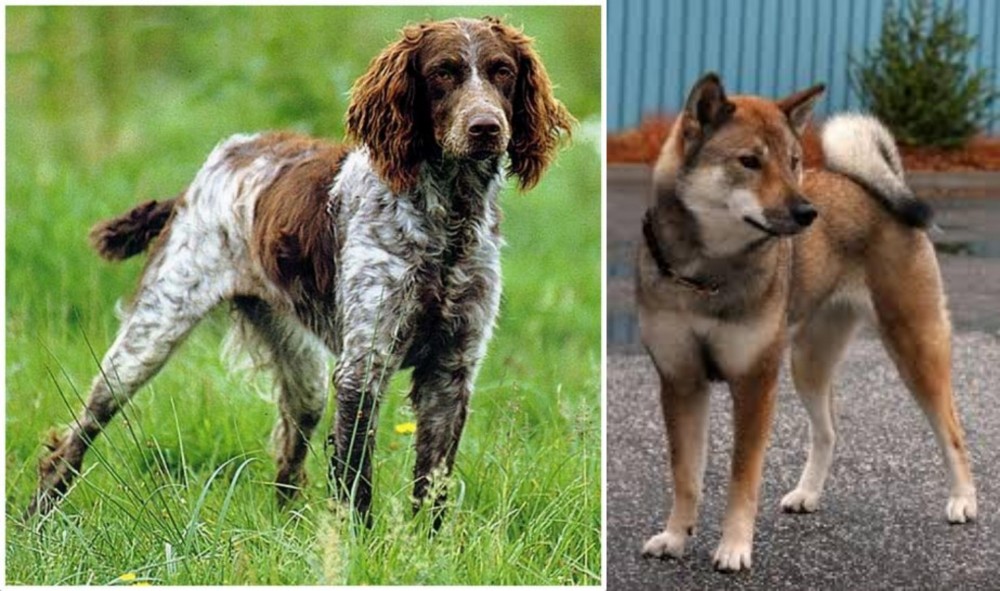 Pont-Audemer Spaniel is originated from France but Shikoku is originated from Japan. Pont-Audemer Spaniel may grow 31 cm / 13 inches higher than Shikoku. Pont-Audemer Spaniel may weigh 26 kg / 57 pounds lesser than Shikoku. Both Pont-Audemer Spaniel and Shikoku has almost same life span. Both Pont-Audemer Spaniel and Shikoku has almost same litter size. Both Pont-Audemer Spaniel and Shikoku requires Moderate Maintenance.
Pont-Audemer Spaniel is originated from France but Shikoku is originated from Japan. Pont-Audemer Spaniel may grow 31 cm / 13 inches higher than Shikoku. Pont-Audemer Spaniel may weigh 26 kg / 57 pounds lesser than Shikoku. Both Pont-Audemer Spaniel and Shikoku has almost same life span. Both Pont-Audemer Spaniel and Shikoku has almost same litter size. Both Pont-Audemer Spaniel and Shikoku requires Moderate Maintenance.
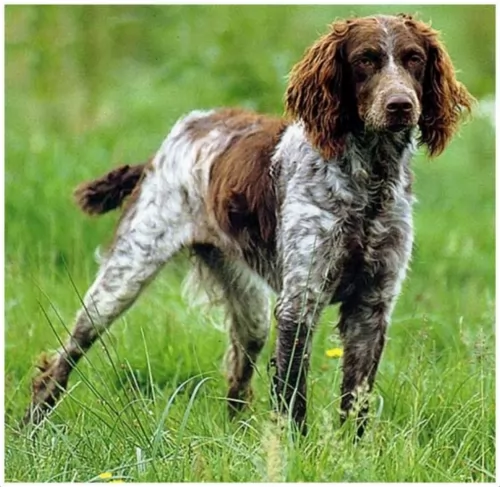 The Pont-Audemer Spaniel hails from France. The dog, known also as Epagneul Pont-Audemer is a rare breed of gun dog, and dates back to the 19th century.
The Pont-Audemer Spaniel hails from France. The dog, known also as Epagneul Pont-Audemer is a rare breed of gun dog, and dates back to the 19th century.
There aren’t clear records on the origins of the dog, but it is thought that it was developed during the 19th century. It is also thought that the dog was bred from the English Water Spaniel and the Irish Water Spaniel.
When numbers of these dogs declined, the president of the Pont-Audemer breed club permitted other breeds to be crossed with the existing gene pool. In 1980, the breed club merged with the Picardy Spaniel club and the dog is recognized by the FCI as the Pont-Audemer Spaniel.
 The Shikoku is from the Shikoku Island in Japan and they are very much like the Japanese Shiba Inu. There are six native Japanese dog breeds and the Shikoku is medium sized and sits in between the smaller Shiba Inu and the very large Akita Inu. All of the Japanese native breeds are members of the Spitz family. The Japanese have sorted their six breeds into 3 categories by size. Being medium size, the Shikoku is a member of the Shika-inus group. Others in this group are the Ainu Ken, the Kai Ken and the Kishu Inu. There are small differences between the three dogs in the Shika-inus group.
The Shikoku is from the Shikoku Island in Japan and they are very much like the Japanese Shiba Inu. There are six native Japanese dog breeds and the Shikoku is medium sized and sits in between the smaller Shiba Inu and the very large Akita Inu. All of the Japanese native breeds are members of the Spitz family. The Japanese have sorted their six breeds into 3 categories by size. Being medium size, the Shikoku is a member of the Shika-inus group. Others in this group are the Ainu Ken, the Kai Ken and the Kishu Inu. There are small differences between the three dogs in the Shika-inus group.
The Shikoku was bred to be a hunting dog in Kochi Prefecture to hunt boar and deer. Other names for the breed include Kochi-ken and Kishu dog or boar hound. This dog is considered to be the purest of the Japanese native dogs or Nihoken. They are today very , very rare. There are very few outsides of Japan, but some in North America are attempting to save the breed.
The are od Kochi Prefecture is a mountainous region with rough terrain that anyone outside of the area would have a hard time accessing. That is why the Shikoku is considered to be so pure as they were pretty well isolated in the mountains. The breeders were also isolated by the mountains and there was very little interbreeding. Although breeding the same dog, these different groups developed different lines of the Shikoku.
Documentation tells us that the number of originals lines was just two and these were the Western and Eastern Shikoku. The Western dog was known as the Mount Ishizuchi Shikoku and the Eastern as the Mount Tsurugi Shikoku. Within these two lines of Shikoku there are additional strains.
Within the Eastern line there is the Tokushima (lya) and the Koci-Aki strains. Within the Western line there is the Hata Uwahara, the Ehime-ken Shuso-gun and the Honkawa. Among these lines and strains, there are different coats and different colors; some heavier and some taller, but all figure into the development of the breed.
Finally, in the Showa Era the Japanese established the Dog Protective League and they began collecting the native dogs from around the country. They protected them so that the breed will go on. The Shikoku is today recognized as Foundation Stock by the AKC and it is fully recognized by the Japan Kennel Club, the Canadian Hound Club and the Shikoku has been declared a living Japanese “natural monument”.
Two bloodlines became the way the Shikoku were know after the war – the Honkawa and the Hata lines The Honkawa line were the descendants of the Choshun-go and the Hata line were the descendants of the Matsukaze-go. They bred the lines separately until 1955, when they mixed them to make the breed stronger. They are no longer considered separate in any way.
Because they are such primitive dogs, the Shikoku are good watch dogs and quite reserved with strangers. They need a lot of socialization to be a family pet but once they are, they make great companions. Intelligent, quick to learn and eager to please. Of the two lines of Shikoku dogs from the Western strains, the current Shikoku owes much of its current development to the Honkawa and Hata strains.
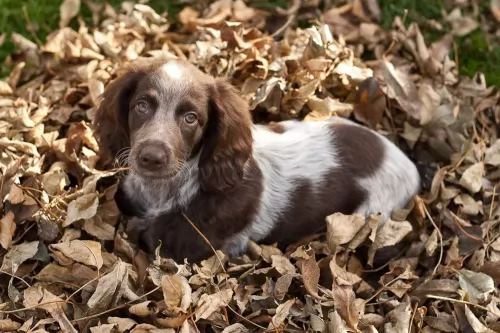 The Pont Audemer Spaniel is a medium- to large-sized breed, standing at between 50 and 58cm in height and weighing in the region of 20 – 27kg, the Pont Audemer Spaniel has a wavy, slightly curly coat of medium length, with some long hair on the top of his head. Common coat colors include white and reddish brown although there are some solid colors too. Te Muzzle of the dog is longish and fairly pointed, the nose brown and they eyes amber or hazel. This is a deep chested dog and wile the tail is traditionally docked, these days it tends to be left long and carried with a slight curve.
The Pont Audemer Spaniel is a medium- to large-sized breed, standing at between 50 and 58cm in height and weighing in the region of 20 – 27kg, the Pont Audemer Spaniel has a wavy, slightly curly coat of medium length, with some long hair on the top of his head. Common coat colors include white and reddish brown although there are some solid colors too. Te Muzzle of the dog is longish and fairly pointed, the nose brown and they eyes amber or hazel. This is a deep chested dog and wile the tail is traditionally docked, these days it tends to be left long and carried with a slight curve.
The Pont Audemer Spaniel is an intelligent dog that will respond well to training. Training and socialization are important for making him well-rounded and obedient. This spaniel-type dog just loves having loads of fun, even to the extent of being clownish.
Because he is a working dog, and an energetic one at that, he wouldn’t do well in a tiny city property but is better suited to life in the suburbs or the countryside. He is a playful dog and will get on well with children. He can also make a great friend of other dogs, particularly if he grew up with them.
 Today’s Shikoku is a medium sized breed with a Spitz like body – square with a head that is wedge shaped. The ears are pointed, and the tail is curved and feathered. They have arched toes and hard pads with dark, hard nails.
Today’s Shikoku is a medium sized breed with a Spitz like body – square with a head that is wedge shaped. The ears are pointed, and the tail is curved and feathered. They have arched toes and hard pads with dark, hard nails.
The two lines of the Shikoku are slightly different in built and look. The Honkawa strain is slender and athletic; agile and single coated. They have dark eyes and most of them are black and tan.
On the other hand, the Hata strain is much heavier boned, with the front more muscular than the rear. They have small ears, a wide skull and a strong undercoat. His eyes are shaped differently than the Honkawa. Their coats are also mostly red and tan.
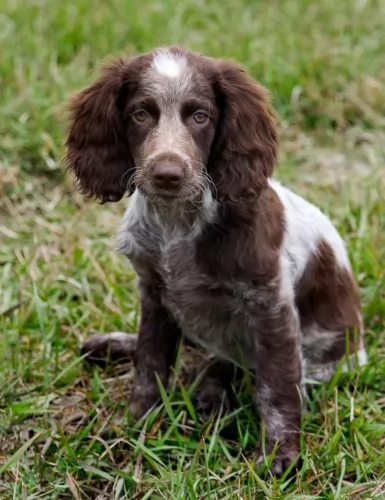 This is truly an old breed of spaniel, loving to spend time outdoors and in marshy areas.
This is truly an old breed of spaniel, loving to spend time outdoors and in marshy areas.
He is a calm, gentle breed, and passionate breeders have worked to preserve it as the dog makes a splendid pet. With an amicable look on his face which has a kind expression, he has other good characteristics to his name such as being intelligent, courageous and energetic.
Whether you’re indoors or out, the Pont-Audemer spaniel is a great companion thanks to his loyalty. Your docile, affectionate and cheerful friend will ensure you tick him off as a pet to be recommended.
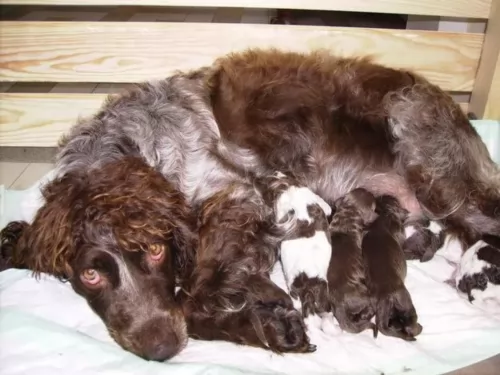 There isn’t a great deal of information on this dog as it is a fairly uncommon breed, but nonetheless a robust dog breed. He can reach 14 years or more if well cared for.
There isn’t a great deal of information on this dog as it is a fairly uncommon breed, but nonetheless a robust dog breed. He can reach 14 years or more if well cared for.
Their long, floppy ears may be a problem as dogs with long ears like this, where sunlight and air don’t reach the insides of the ear, are more prone to dampness, dirt and wax. The inside of the ears becomes a breeding place for bacteria.
It is the deep chest of the Pont-Audemer Spaniel that can put him at risk for developing bloat. When a dog like this becomes bloated you can actually see the swollen, hard stomach. The dog is extremely restless, he is panting and pacing. Immediate veterinary attention is required as this is a life threatening illness.
Known also as alopecia, there are a few things that can cause your pet to lose his hair. These can be hormonal issues or parasites such as worms.
 Being isolated as they were, the Shikoku was a fairly healthy breed, no genetic testing has been done. Despite this they suffer a few of the same potential issues as other breeds their size.
Being isolated as they were, the Shikoku was a fairly healthy breed, no genetic testing has been done. Despite this they suffer a few of the same potential issues as other breeds their size.
Otherwise this is an agile and hardy breed with no known congenital health issues.
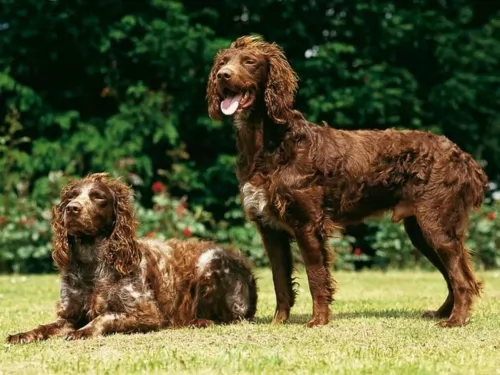 The Pont-Audemer Spaniel has always been a working breed so he is used to being active. They have high exercise requirements and will require having quite a large outdoor space to run. Ball and rope games are a must for him, lots of swimming and hikes as well as a daily walk.
The Pont-Audemer Spaniel has always been a working breed so he is used to being active. They have high exercise requirements and will require having quite a large outdoor space to run. Ball and rope games are a must for him, lots of swimming and hikes as well as a daily walk.
Even though the fairly long hair of the spaniel looks as though it may require quite a bit of upkeep, the Pont Audemer Spaniel is a low maintenance dog that will require a good brush twice a week.
While you’re brushing him, feel him over for any new, unusual lumps. Look into his eyes to make sure they’re bright and alert. Check around his ears for ticks and fleas and look inside his ears for dirt and wax which could lead to bacteria and an ear infection.
You don’t want your dog gaining weight and becoming obese as this opens up a whole lot of health issues. There are always dogs that can gain weight after they have been spayed or neutered. Remember if you’re using commercially manufactured dog food, to make sure it is high quality and also suited to your dog’s age, it’s season of life and its activity levels.
Give your canine friend some home-made food too, bearing in mind that dogs like simple, healthy food that won’t upset their stomachs, and which will be good for them too.
Boiled chicken, brown rice or pasta, sweet potatoes, carrots and spinach all chopped up can be so beneficial for your pet. If you cook it in bulk, it can be put into portions and some of this can be added into the dry kibble occasionally. This is a great treat for your dog.
Some raw meat added in from time to time can also be hugely benefit for your pet. Avoid all spicy, exotic foods for your pet.
Make sure he always has a bowl of fresh, cool water available to him.
 Feeding the puppy Be careful with feeding the puppy and adult as the breed is known to have a tendency toward obesity. Fresh food is better as it is what the breed has been used to, but a high quality puppy kibble is acceptable. Feed three times per day.
Feeding the puppy Be careful with feeding the puppy and adult as the breed is known to have a tendency toward obesity. Fresh food is better as it is what the breed has been used to, but a high quality puppy kibble is acceptable. Feed three times per day.
2.Feeding the adult He is a high energy dog so feed a high energy food designed for a medium sized dog. Feed in two meals each day.
4. Games and Exercises You will need a fenced yard for this breed and time to play with them. If not, you would need time to walk her more than once a day. They love to play indoors as well, chasing balls, learning new things. The breed make great companions for hiking, swimming, play frisbee or catch outside. They do well at agility, rally, obedience and flyball.